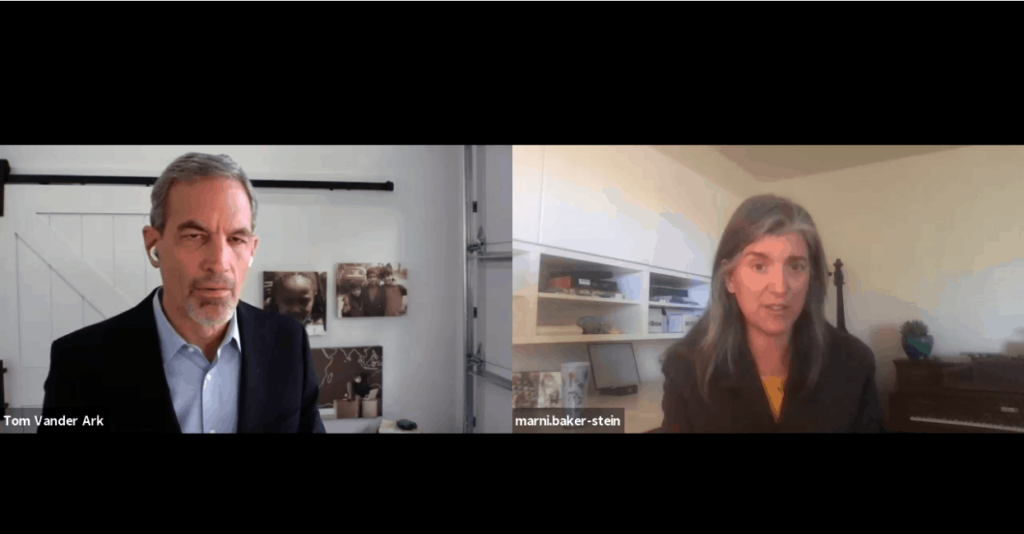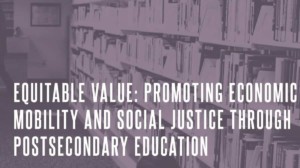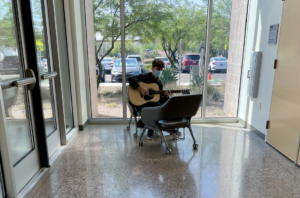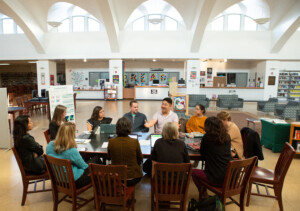Marni Baker Stein on What’s Next For Higher Education

On this episode of the Getting Smart Podcast, we’re talking with Marni Baker Stein, Provost and Chief Academic Officer at Western Governors University (WGU).
For over 25 years Marni Baker Stein has been designing and scaling programs to improve access, affordability, and student success. Prior to joining WGU, she worked for educational institutions in the U.S. and abroad on the development and administration of pioneering high school, undergraduate, graduate, continuing, and professional programming models delivered through competency-based, online, and hybrid formats.
She was selected by the Department of Education to serve as a member of the National Technical Working Group charged with expanding the 2016 National Educational Technology Plan and using technology to transform higher education.
Upon arriving at WGU, Stein realized the greatest strength of the university — she believes it is the world’s most learner-centered institution. Together, they were able to redefine what competencies mean for WGU and rethink how they can dynamically track the relevancy of their programs in terms of employer needs. For example, with regards to skills: WGU put together a skills architecture team alongside national competency networks. They then used EMSI, a common way to describe skills, to tag them to a competency and execute dynamic audits of performance.
This leads to the open badge standard, a method that is spreading through education and beyond. “Establishing a logic of how many of those competencies are worth adding to the transcript. We don’t want to overwhelm students with micro-achievements, we want to make sure we can tell and share the most important ones,” said Stein.
On what learners need: “Learners desperately need education to organize itself around what they need it to become.”
On the role of advisors: WGU uses a Distributed Faculty Model. In this model, every student is at the center of a community of care. Advisors are called mentors (longitudinal). The advisor and learner meet at the beginning and work together to establish pace, term plan, learnings — and how it all informs the path ahead.
Students get a program level assessment to determine motivations before entering any program. At the beginning of any course students all take an assessment that takes a deep dive into their readiness.
She also touches on the Open Skills Network, rich skills data that is tied to real-time demands. “Let’s figure out how to define skills at scale and agree to publish them in an open format so everyone can use. Over 90 institutions who are actively involved in this work. Ourselves, SNHU, Georgia State System, ACE, Wal Mart, Amazon, Udacity, US Chamber, more… Concentric Sky.”
These developments will lead to a skills library that everyone can use and will encourage diversity in employment and educational institutions. Tagging all things to a skill makes them universally valuable — something that is particularly important with Human+ degrees.
Key Takeaways:
[:10] About today’s episode with Marni Baker Stein.
[1:05] Tom Vander Ark welcomes Marni to the podcast.
[1:14] Why did Marni study French and Economics at Penn State University?
[2:15] When Marni was pursuing her Ph.D. in Educational Leadership at Penn State, did she already have her sights set on higher ed?
[2:43] Marni shares how she came to launch the first English language MBA programming in the former Soviet Union after finishing up her Master’s Degree (and later in Japan and Turkey).
[4:01] The big takeaways from Marni’s experiences developing English programs abroad.
[5:07] Marni’s experience as a Curriculum Coordinator at UC Santa Barbara.
[6:28] In 1998, while helping Penn State launch their online learning program, did Marni have any visibility to Western Governors University (WGU) starting out in Salt Lake City?
[8:04] Background on the founding of WGU.
[8:33] Highlights from Marni’s four years as Chief Innovation Officer at the University of Texas System.
[11:14] Three-and-a-half years ago, Marni became the Provost and Chief Academic Officer at the Western Governors University (WGU). She shares about the state of the university at the time; what she saw that they were doing well and areas she saw as an opportunity for improvement.
[14:21] How the learning model at WGU has changed in the last three years and what’s next for the learning model.
[15:54] Marni elaborates on the progress they’ve made at WGU with regards to focusing on what learners need to know, how they know what learners know, and how they can communicate and capture that.
[16:54] About WGU’s “achievement wallet” that they’re rolling out in the spring and how it will help transcript students’ competencies.
[18:42] At WGU, mentors play a really important role. Marni describes this role and how they guide the learning journey for students.
[21:01] How a mentor helps a learner find out if they’re in the right academic program.
[22:22] If a learner is struggling with a concept in a class, do they go to their mentor or their course instructor? How would they connect to academic support?
[23:30] Are they using a Case Management approach? Is software involved in keeping the learner up-to-date?
[24:39] With a set of partners, Marni launched the Open Skills Network. She describes what it is and its overall mission and vision.
[27:42] Lately the education landscape has been shifting away from degrees to more skill-based progression. What does this mean for traditional higher education?
[32:40] Does Marni predict that more learners will be mixing and matching to create unique pathways?
[32:59] Have enrollments increased at WGU since COVID-19? How is WGU participating in the lifelong learning space going forward?
[34:41] Is WGU the largest school of education in the country?
[35:01] Marni gives an update on Mark Milliron, their Senior Vice President and Executive Dean, as well as an exciting initiative that is being worked on right now.
[36:25] Where to learn more about WGU?
[37:16] Tom thanks Marni for joining the Getting Smart Podcast.
Mentioned in This Episode:
- Marni Baker Stein’s LinkedIn
- Getting Smart Podcast Ep. 228: “Michael Horn on Choosing College”
- The Pennsylvania State University (Penn State/PSU)
- Western Governors University (WGU)
- University of Texas System
- University of Texas Rio Grande Valley (UTRGV)
- Open Skills Network (OSN)
- WGU 2019 Annual Report
- Mark and Alex Milliron on the Sugar Chair Stories







0 Comments
Leave a Comment
Your email address will not be published. All fields are required.